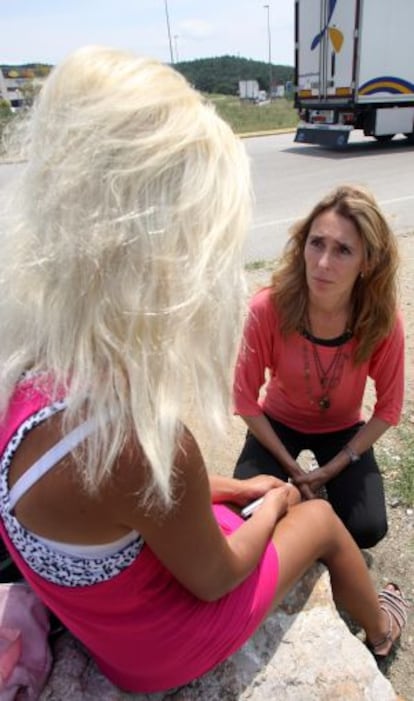How the coronavirus crisis has affected sex workers in one of Europe’s biggest brothels
Women at a well-known club in the Catalan border town of La Jonquera were turned out on the street from one day to the next


The Catalan border town of La Jonquera, a busy crossing point for traffic between Spain and France, is also home to one of Europe’s biggest and best-known brothels, Paradise. At 2,700 square meters, it has 80 rooms and also provides accommodation for its sex workers.
Inaugurated in 2010, this establishment shut its doors on March 13, as many other businesses across Spain did after the government decreed a state of alarm and introduced strict confinement measures for the population in a bid to contain the spread of the coronavirus.
The approximately 90 women who work there, according to one sex worker’s estimate, suddenly found themselves out on the street. “We were literally standing in the street with our suitcases in our hands,” she said.
The brothel is located on the outskirts of La Jonquera, in an area filled with large restaurants, gas stations, supermarkets, casino hotels and sex shops. The town is home to many other brothels besides the Paradise due to its location, which makes it a busy transit hub at all times of the year.
Layoffs
The club’s owner, José Moreno, has filed for a temporary layoff scheme known as ERTE, which the government has created specifically to address the economic fallout of the coronavirus crisis.
Moreno’s ERTE affects 69 employees at Paradise, none of whom are sex workers. Despite physically using the premises, the latter have no formal legal ties with the company, from which they rent out the rooms. In Spain, where prostitution is not regulated but pimping is illegal, licenses are granted to “clubs” that may work as brothels as long as the sex workers are not directly hired by the owner.
“We are desperate, like everybody else,” said Moreno in a telephone interview last month. “Closing is the best solution: for the women, for the clients, for the staff...for everyone.” Moreno has been working in the brothel business for years, and has been the target of several criminal investigations. In 2012 he was sentenced to three years in prison for favoring illegal immigration, after it was proven that he was bringing women in from Brazil for prostitution.
We were literally standing in the street with our suitcases in our handsSex worker at Paradise
One of the sex workers said that when they were turned out, the streets were so deserted that “it looked like there had been a fire, or a zombie war.”
Many of the women who work at the Paradise club also lived on the premises. They explain that they need to rent a room for at least 21 days to get a guaranteed spot inside the downstairs club.
“I was suspicious when I heard that he [Moreno] was not going to shut down the rooms,” said one woman who spoke on condition of anonymity. “There was talk that the owner was not showing much solidarity. This is a business, and he is a businessman.”
The day after the government decree, the mamis (the women who manage the rooms) confirmed that everyone had to be out by noon.

Moreno says he had no choice but to close because the maintenance costs are very high, including a monthly rent of €42,000. “There are just three security guards left to ensure that nobody goes in. Two months of closure means ruin. We’ve survived so far, but we’ll see what happens from now on.”
As for the sex workers, everyone scrambled to find a new place to stay. “Those of us without any family members here did not know what to do. So we just looked up at heaven,” said the anonymous woman, who has since found someone to stay with. “Some of them moved to Figueres [in the province of Girona], others went back to Romania, others traveled to France... the only help they got was from the kitchen mamis. They offered us their homes, but they are making a low salary. You can’t move in with them and eat their food.”
This woman came to Spain exclusively to work at the Paradise club. Her plan was to work for three months and go back to her country. But the return ticket has been canceled, and she cannot afford to buy a flight back: the last available fare was going for €4,000.
“My family cannot help me, I am helping them,” she says. She is considering going to her country’s consulate to seek help, but “they are busy helping the sick people, and I understand.”
My family cannot help me, I am helping themSex worker at Paradise
The sex workers at the Paradise club pay €80 for a room (€75 in rent and five more euros for electricity). This price includes two meals a day. Those who go downstairs into the club area after 6pm must pay an additional €90.
“Work was very bad. We were only working two days a week, but you still had to pay for the room. Getting those €90 was not easy,” explains this woman, who despite her situation is not considering violating Spanish law by engaging in prostitution in private apartments.
“Where do those women go? What social services do they turn to for help?” wonders Clarisa Velocci, of a support association named Genera that is providing telephone assistance to sex workers affected by the confinement orders in Spain.
“We guarantee that we will cover any need they might have, whether it be food or accommodation,” said the mayor of La Jonquera, Sònia Martinez. The mayor said that so far the police has not found any of these women living on the streets, and that none of them has asked for help, either.
Velocci says the sex workers have had to rely on their own wits to get ahead, and she asks for greater social protection by “flexibilizing economic aid for women in their situation.”
English version by Susana Urra.
Tu suscripción se está usando en otro dispositivo
¿Quieres añadir otro usuario a tu suscripción?
Si continúas leyendo en este dispositivo, no se podrá leer en el otro.
FlechaTu suscripción se está usando en otro dispositivo y solo puedes acceder a EL PAÍS desde un dispositivo a la vez.
Si quieres compartir tu cuenta, cambia tu suscripción a la modalidad Premium, así podrás añadir otro usuario. Cada uno accederá con su propia cuenta de email, lo que os permitirá personalizar vuestra experiencia en EL PAÍS.
¿Tienes una suscripción de empresa? Accede aquí para contratar más cuentas.
En el caso de no saber quién está usando tu cuenta, te recomendamos cambiar tu contraseña aquí.
Si decides continuar compartiendo tu cuenta, este mensaje se mostrará en tu dispositivo y en el de la otra persona que está usando tu cuenta de forma indefinida, afectando a tu experiencia de lectura. Puedes consultar aquí los términos y condiciones de la suscripción digital.








































